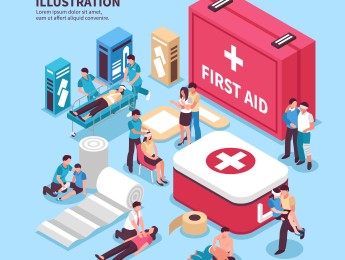This comprehensive course is tailored for individuals who require advanced first aid training to manage a broader range of medical emergencies with confidence and competence. Going beyond basic life-saving techniques, it addresses complex scenarios such as strokes, severe allergic reactions, diabetic crises, and musculoskeletal injuries.
Participants will learn how to conduct a detailed secondary assessment, deliver targeted care in high-risk situations, and support patients until professional medical help arrives. The course combines theory, scenario-based training, and practical skills development to prepare attendees for real-world emergencies in both personal and professional contexts.
By the end of this course, participants will be able to:
- Perform a full secondary assessment to identify hidden or secondary injuries.
- Recognize and manage critical emergencies such as strokes, heart attacks, anaphylaxis, and poisoning.
- Provide appropriate care for bone fractures, joint dislocations, and spinal injuries.
- Handle diabetic emergencies, epileptic seizures, asthma attacks, and other chronic conditions.
- Administer effective first aid for eye, neck, and head injuries.
- Understand the legal and ethical responsibilities of an advanced first aider.
This course is ideal for:
- Workplace first responders and emergency teams.
- Healthcare and allied support workers.
- Security and safety personnel.
- Teachers, sports coaches, and caregivers.
- Anyone seeking advanced, comprehensive first aid training.
This course integrates a dynamic blend of interactive lectures and visual demonstrations to enhance understanding, alongside hands-on simulations and scenario-based practice for practical application. Team exercises and role-playing help participants develop confidence in high-pressure situations, while group debriefs and reflective discussions encourage deeper insights. Additionally, skill assessments with instructor feedback ensure continuous improvement and mastery of essential techniques.
Day 5 of each course is reserved for a Q&A session, which may occur off-site. For 10-day courses, this also applies to day 10
Section 1: Advanced Scene Assessment and Secondary Survey
- Refreshing DR ABC and basic emergency response.
- Step-by-step secondary assessment: head-to-toe evaluation.
- Vital signs monitoring and documentation.
- Communication with medical professionals during handover.
Section 2: Critical Medical Emergencies
- Stroke and heart attack recognition and response.
- Signs and first aid for severe allergic reactions (anaphylaxis).
- Management of poisoning and exposure to harmful substances.
- Sudden deafness and neurological changes: immediate actions.
Section 3: Musculoskeletal Injuries
- Types of bone fractures: open, closed, and stress.
- Joint dislocations and immobilization techniques.
- Using slings, splints, and support bandages.
- Recognising spinal injury signs and minimizing movement.
Section 4: Eye, Neck, and Head Trauma
- First aid for foreign objects and blunt trauma to the eye.
- Emergency care for neck strain and potential spinal issues.
- Concussion symptoms and head injury protocols.
- Bandaging and support techniques for facial injuries.
Section 5: Chronic Condition Management
- First aid for diabetic hypoglycemia and hyperglycemia.
- Recognizing epileptic seizures and post-seizure care.
- Managing asthma attacks with inhaler assistance.
- Identifying symptoms of other chronic conditions in crisis.
Upon successful completion of this training course, delegates will be awarded a Holistique Training Certificate of Completion. For those who attend and complete the online training course, a Holistique Training e-Certificate will be provided.
Holistique Training Certificates are accredited by the British Accreditation Council (BAC) and The CPD Certification Service (CPD), and are certified under ISO 9001, ISO 21001, and ISO 29993 standards.
CPD credits for this course are granted by our Certificates and will be reflected on the Holistique Training Certificate of Completion. In accordance with the standards of The CPD Certification Service, one CPD credit is awarded per hour of course attendance. A maximum of 50 CPD credits can be claimed for any single course we currently offer.
- Course Code PO2 - 135
- Course Format Classroom, Online,
- Duration 5 days










